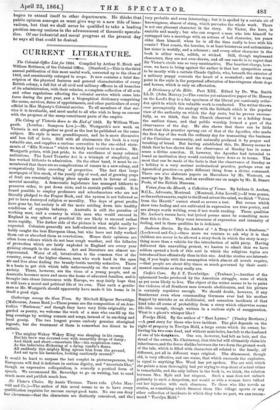A Dictionary of the Bible. Part XIII. Edited by Dr.
Wm. Smith LL.D. (John Murray.)—The concise yet exhaustive paper of Dr. Hassey on the Lord's Day is a fair specimen of the liberal yet cautiously ortho- dox spirit in which this valuable work is conducted. The writer throws over peremptorily the analogy with the Sabbath which is the popular view of the authority on which the day rests; but he proves success- fully, as we think, that the Church observed it as a holiday from the earliest times, and that public worship formod a part of the observances of the day. He also shows that there can be little doubt that this practice sprang out of that of the Apostles, who made the first day of the week the ordinary day for transacting the business of the Christian community, and naturally prefaced it by prayer and breaking of bread. But having established this, Dr. Hessey seems to think that he has shown that the observance of Sunday has in some sense a divine sanction. If, however, the Apostles had intended to found an institution they would certainly have done so in terms. The most that can be made of the facts is that the observance of Sunday as a holiday is a very ancient ecclesiastical practice, perhaps even an Apostolical practice—a quite different thing from a divine command. There are also elaborate papers on Maccabees by Mr. Westcott, on marriage by Mr. Bevan, and an excellent one on magic by Mr. R. Stuart Poole, of the British Museum.






























 Previous page
Previous page